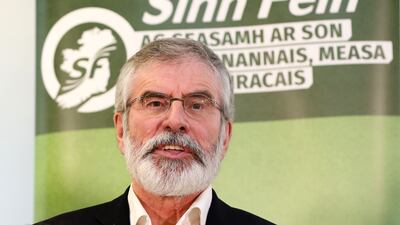Irish nationalist party Sinn Fein said on Wednesday that its talks with the pro-British Democratic Unionist Party aimed at re-establishing a power-sharing government in Northern Ireland had failed.
"Sinn Fein is disappointed that after the last few weeks of negotiations it has ended in failure," Sinn Fein's leader in Northern Ireland, Michelle O'Neill, told journalists. "We did our best to be flexible."
She called on the British and Irish governments "to act urgently to deliver equality" in Northern Ireland following the failure of the assembly to deliver it, citing the terms of the 1998 Good Friday peace deal.
Sinn Fein leader Gerry Adams said the party was open to dialogue, but only if it was meaningful.
_______________
Read more:
UK's May strikes Dh4.7bn deal for support in government from Northern Ireland party
May warned that alliance could derail Irish peace
_______________
However, a senior member of the DUP blamed Sinn Fein for the collapse of the talks and suggested the DUP would not compromise on the key issue of the Irish language.
Member of parliament Gregory Campbell accused Sinn Fein of holding back government with "a narrow political agenda".
Mr Campbell suggested that the DUP would not accept Sinn Fein’s demands for additional rights and funding for Irish language speakers, the key sticking point in talks in recent weeks, saying it already receives ample public funding.
"We cannot and will not be party to an agreement that elevates the Irish language not only above all others, but above health, education and other vital public services," he said.
Amid the political deadlock, the British government is preparing to move to directly impose an annual budget on Northern Ireland for the first time in a decade.
The move is a major step towards a return to direct rule from London, which many fear would destabilise the delicate political balance in Northern Ireland.
It also creates a major headache for British Prime Minister Theresa May as she negotiates Britain's exit from the European Union.
Sinn Fein and the DUP have shared power in Northern Ireland under the terms of the 1998 agreement, which ended three decades of violence in which 3,600 died.
But Sinn Fein pulled out in January, complaining it was not being treated as an equal partner.
Britain's minister for Northern Ireland James Brokenshire said as there was no immediate prospect of a new executive being formed that he had no choice but to start the process of setting a budget directly from London to ensure funding for essential services.
"This can't simply continue forever and a day ... There are decisions that have been stored up that have to be taken," he told journalists.
The budget process could be handed back if agreement is reached between the two parties, he added.

